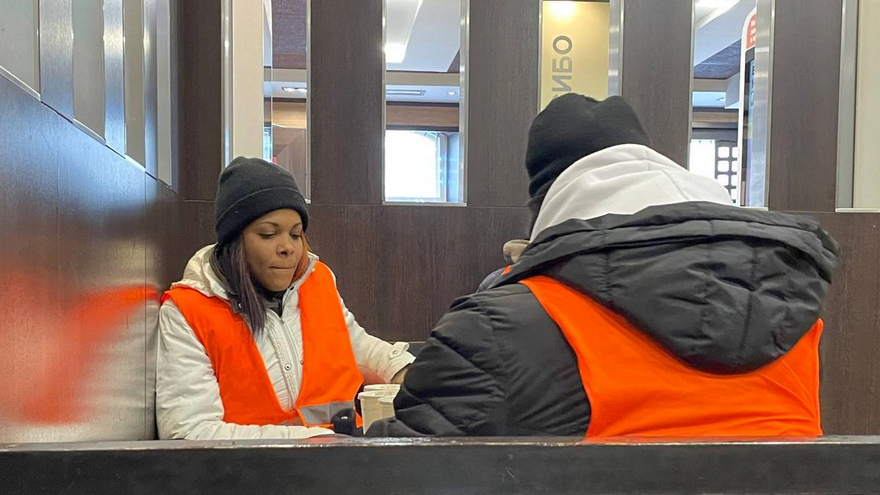
![]() 14ymedio, Madrid, 22 January 2024 — Russian media has discovered that dozens of Cubans are clearing large amounts of snow from Moscow streets. Last weekend the online news site MSK1 interviewed a group of young people from the island who do this work in the Arbat and Khamovniki districts.
14ymedio, Madrid, 22 January 2024 — Russian media has discovered that dozens of Cubans are clearing large amounts of snow from Moscow streets. Last weekend the online news site MSK1 interviewed a group of young people from the island who do this work in the Arbat and Khamovniki districts.
“My name is Robert. I’m from Cuba,” said the head of the makeshift brigade. “Generally, my team has 150 to 200 people. We work in the Arbat but we can work wherever they might need us. We came here on our own, voluntarily, not as part of a government program.”
MSK1 met in a fast-food restaurant with some of Robert’s team members, who said emphatically that they were very satisified with their Russian jobs. “There is no one from Cuba controlling us. My boss is Uzbek. My salary comes straight to me. I don’t have to hand it over to anyone,” one of them says smiling.
According to these immigrants, their pay is almost double what they would receive in Cuba. They can also buy most things at very affordable prices
Their salary, they claim, is 34,000 rubles a month, more than 9,000 Cuban pesos. According to these immigrants, their pay is almost double what they would earn in Cuba. They can also buy most things at very affordable prices. In Cuba, they report, they would need at least 3,000 pesos to buy a canned cola — alternatively, a domestically produced version goes for 220 pesos — but in Russia it is much cheaper and they can drink as much soda or eat as many hamburgers as they like.
Judging from accounts on social media, Cuban recruits have been removing snow from Russian streets for years. What the MSK1 reporter chooses to focus on, however, is the Cubans’ dark complexions, which — he takes pains to point out — constrast with the whiteness of the snow. This has made them the center of attention of local residents. He also refers to their birthplace, more than once, as “freedom island.”
“Robert prefers not to discuss the realities of life in a country with a planned socialist economy but he has no problem praising the new Russian-Cuban relations and sees Russia as a great friend to his country,” the article states. “It’s cold in Russia but I really like it here. It’s all good! Russia is a great friend of Cuba!” says the young man, dressed in the scarf of a sports club to protect himself from the Russian capital’s freezing temperatures , which this January have been even lower than usual.
Local residents are surprised at the sight of the Cubans, the article states, initially confusing them with immigrants from Central Asia, though they later realize that their complexions are even darker.
It is difficult, however, to know just how this type of employment works. “No foreigners of any kind work for the Office of Housing in the Arbat district except citizens of the CIS (Commonwealth of Independent States). All of them have the necessary permits and registrations. We are strict about this. Not just anyone gets accepted,” says a state employee who denies any connection to the Cubans, even expressing surprise at their identifiable clothing. “I don’t know where they got those jackets. I swear they’re not ours,” he insists.
However, the district’s press office confirmed that the immigrants – Cuban students as it turns out – are working as backup personnel on a paid, voluntary basis. “Currently, we are fully staffed, with almost 17,000 people. But during heavy snowfalls, we need additional resources to clear the district’s streets. Very often, those who volunteer to participate are students, some of them Cubans, who are provided with the necessary equipment and special clothing,” it states.
The devaluation of the ruble is affecting the entire country, which previously attracted many immigrants but now is attracting Cubans almost exclusively
MSK1, on the other hand, reports that Russia needs an additional 4.8 million workers based on a study by the Russian Academy of Sciences’ Institute of Economics. The problem is especially critical in jobs that do not require special qualifications, as is the case here, in which employees do not even need to speak the language.
The devaluation of the ruble is affecting the entire country, which previously attracted many immigrants but now is attracting Cubans almost exclusively. “They save every penny to send home to their families,” says analyst Valery Mironov, who was interviewed by MSK1. “The ruble exchange rate is very important to [the other immigrants]. When it was fifty rubles to the dollar, that was a good salary. But now that it has fallen to almost half that for almost the same salary, they’re not coming,” he adds.
“It is simply does not make economic sense for them to come here. They prefer to go to neighboring Kazakhstan or Europe instead. For Cubans, however, it is all much simpler. They earn a good salary here. I also think that there is some kind of special government program,” Mironov surmises.
____________
COLLABORATE WITH OUR WORK: The 14ymedio team is committed to practicing serious journalism that reflects Cuba’s reality in all its depth. Thank you for joining us on this long journey. We invite you to continue supporting us by becoming a member of 14ymedio now. Together we can continue transforming journalism in Cuba.
